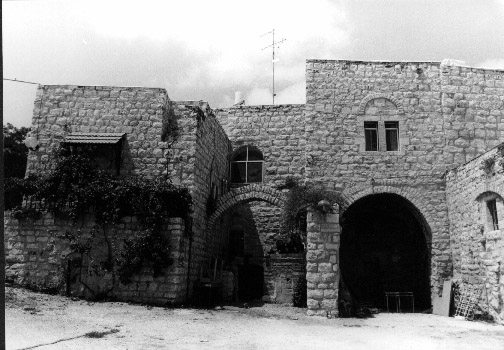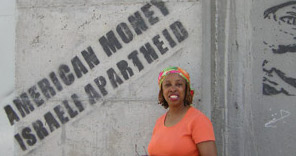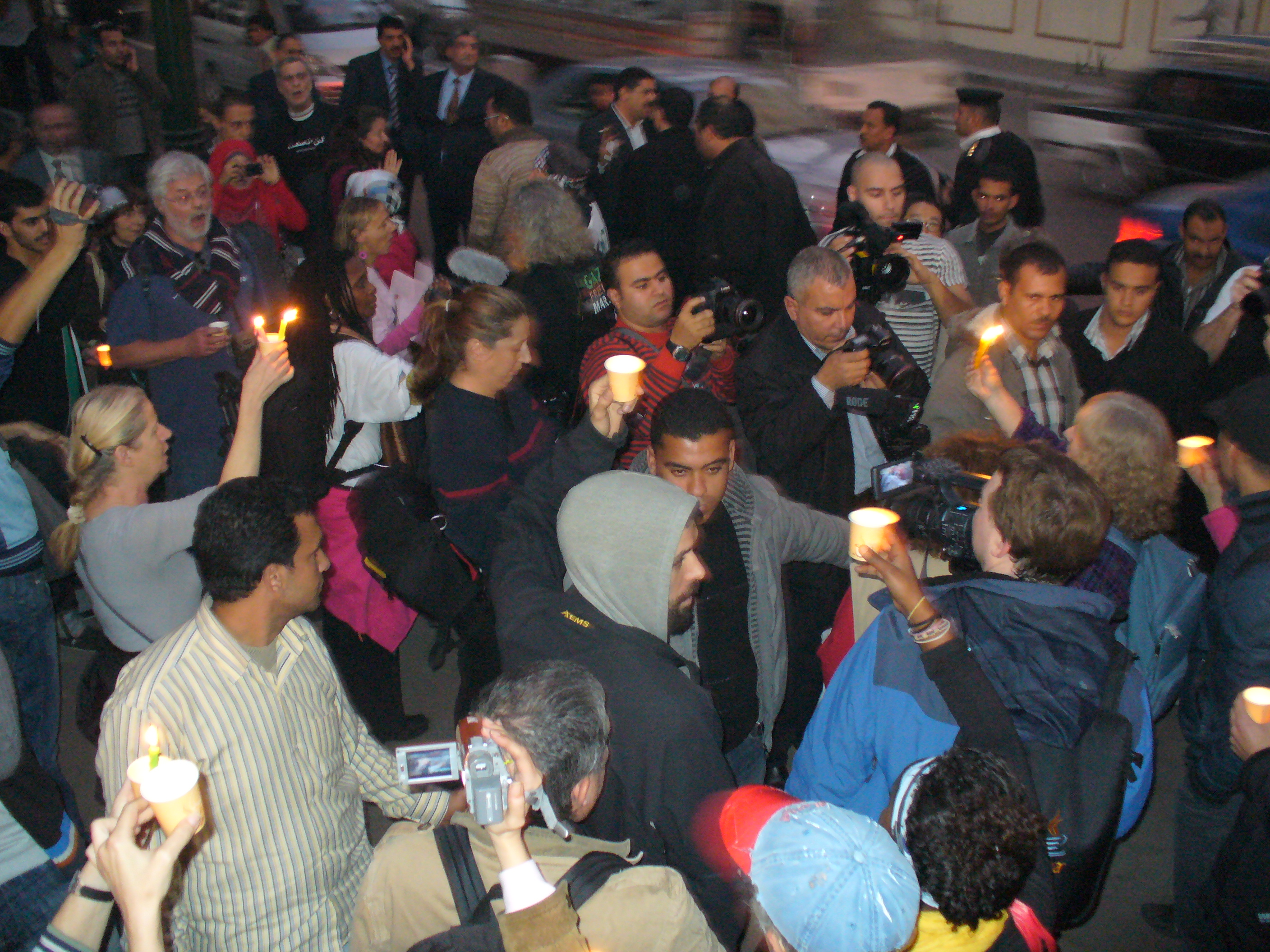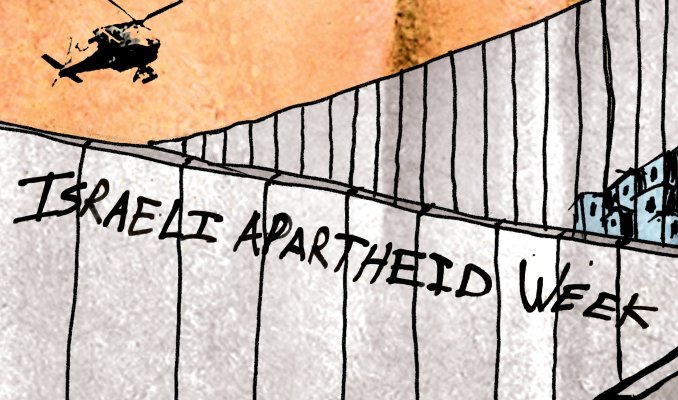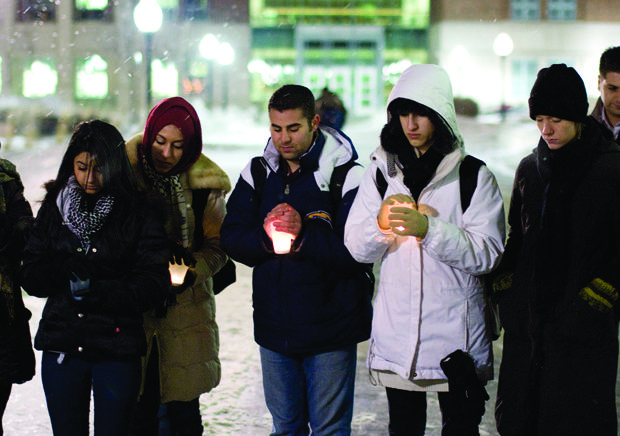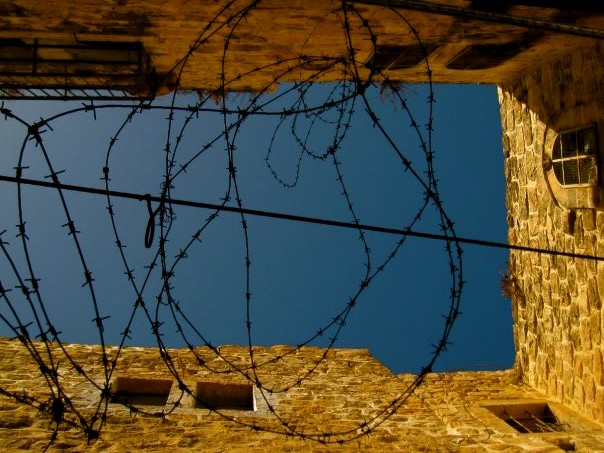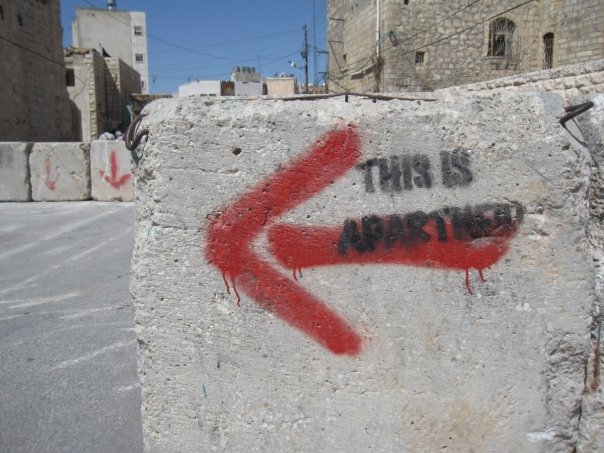Sanna Towns, Race-Talk, 4 March 2010
In two of Martin Luther King, Jr.’s most memorable writings, his “Letter from a Birmingham Jail” and his 1967 speech, “Beyond Vietnam – A Time to Break Silence,” he bemoaned the failure of Americans to speak out, to break their silence when witnessing injustice and immoral acts against humankind. He confessed his disappointment that Birmingham’s white Christian and Jewish communities were more devoted to “’order’ than to justice.” Motivated in his “Beyond Vietnam” speech to break “the betrayal of [his] own silences,”
King called for a “true revolution of values” within the United States – a revolution that shifted from profit motives and property rights to a society that valued people. A society, he lamented, that didn’t speak to the social betterment of humanity was not just and thus made the “giant triplets of racism, extreme materialism, and militarism . . . incapable of being conquered.”
Today there is a growing community of human rights activists in the U.S., around the world, and especially in Palestine-Israel whose behavior mirrors and extends King’s confrontation with injustice in their own efforts to break the silence on the injustice of the cruel, oppressive Israeli military occupation of the Palestinian people. They realize that by maintaining a deafening silence, mainstream U.S. media and political leadership keep large segments of the U.S. population ignorant about the true nature of the Palestinian struggle for freedom, justice, and human rights. Few Americans know that the Palestinian freedom struggle has been predominantly nonviolent for the vast majority of Palestinians, and has always been grounded in some of the same principles expounded by Martin Luther King, Jr.
In his “Letter,” King identifies four basic components of a nonviolent campaign: “collection of the facts to determine whether injustices exist; negotiation; self purification; and direct action.” So what are the facts of the Israeli injustices against the Palestinian people? For more than 62 years beginning in 1948, reminiscent of the ethnic cleansing experienced by Native Americans, Palestinian Muslims and Christians (the indigenous descendants of the first Christians) have suffered as the Israeli government expels them from their homelands, creating the state of Israel upon the 500-plus Arab-Palestinian towns and villages.[i] The suffering continues under a 42-year Israeli occupation marked by land confiscations for settlement building and wall construction and by restrictions on movement: to work, markets and water; to agricultural land and olive trees; to health facilities and educational institutions; and to Christian and Muslim religious sites, all but destroying family ties – discrimination similar to America’s segregated past. The separation wall and Israeli-only roads and settlements in Palestine divide populations racially for the benefit of illegal Israeli settlers (echoes of apartheid South Africa). Israel’s apartheid system has caused thousands of civilian deaths, many of them children, and widespread human rights violations.[ii] While the injustices mount, Israel has defied rulings by the International Court of Justice,[iii] violating more than 65 UN Resolutions and the Fourth Geneva Convention.[iv]
Americans have been led to believe that Palestinians have not been “honest partners for peace.” The truth is, however, negotiating for their freedom has been a daunting task. Palestinians have experienced the same broken promises, “blasted” hopes, and deep disappointments that King describes in his negotiations with Birmingham’s white leaders. President Clinton’s famed Oslo Peace Process began in 1993 with negotiations between Palestinian and Israeli leadership and the promise to end Israel’s occupation and the formation of a Palestinian state. Essential to these negotiations, however, was a blatant imbalance of power: on the stronger side, the nation of Israel, militarily superior and prosperous, supported by the wealth and power of the U.S., controlling more than 78% of original Palestine; on the weaker side, the Palestinians, barely surviving and holding on to the remaining 22% of land.
Currently, Palestinian leadership has refused to return to negotiations due to Israel’s unwillingness to abide by past agreements and to cease expanding illegal settlements. Israel has scoffed at and dismissed longstanding U.S. policy of ending illegal Israeli settlement expansion in Palestine, a policy that President Obama attempted but failed to enforce upon Israel.
Surviving this imbalance and the suffering it causes has been traumatic for Palestinians, requiring unimaginable resources of strength and faith. King would have identified with their plight and their need to find ways to cope with and confront their circumstances in ways that enable them to sustain themselves. King describes the process of self-purification as self-analysis and a way of discovering the extent to which he and his fellow protesters were prepared to endure the ordeals of their nonviolent actions. For many Palestinians, their lives as devoted Muslims and Christians make self-purification through fasting and prayer a much-practiced tradition and surely one that has empowered them during nearly 100 years of suffering and injustice. One ultimate self-purifying act within Palestinian society is articulated in the recent Kairos Document by Palestine’s Christian leadership, a document that proclaims “that our Christian word in the midst of all [the tragedies in our lives], in the midst of our catastrophe, is a word of faith, hope and love.”
While Americans know well the direct action tactics of the movement King led, little do they know about the decades of Palestinian engagement in nonviolent, civil resistance for justice and freedom. As far back as 1902, Palestinian villagers, in what is now Israel, staged peaceful protests against confiscation of their land by European Zionist settlers. From 1987 to 1993, during the largely nonviolent mass movement of the First Intifada, Palestinians were involved in mass public demonstrations, refusing to pay taxes, boycotting Israeli goods and facilities, and planting olive trees on land confiscated by Israelis.[v] But the most effective resistance to Israeli expulsions, expansionism, and occupation has been their refusal to stop “living in their homes, going to school, eating and living.”
According to Palestinian scholar and human rights activist Mazin Qumsiyeh, “this colonial occupation wants all Palestinians to give up and leave the country. . . . When Shepherds . . . go to their fields despite repeated attacks by settlers and even the attempted poisoning of their sheep, that is non-violent resistance. When Palestinians walk to school while being spat on, kicked and beaten by settlers and soldiers, that is non-violent resistance. When Palestinians spend hours at check points to get to hospital, their farm land, their work, their schools, or to visit their friends, that is non-violent resistance.”
More recently, Palestinians, along with Israeli and international activists, are resisting by protesting the construction of the separation wall that is stealing more of their land. In February, demonstrators in the village of Bil’in cleverly invoked Hollywood, reenacting the film Avatar by dressing up as the blue Na’vi natives opposing the encroaching occupation of an Alien (human) corporate empire.
Israel’s typical response to these nonviolent protests and others by Palestinians against home expulsions in East Jerusalem includes shooting rubber bullets and live ammunition, tossing tear gas, and showering protesters with sewage – the Israeli equivalent of Alabama’s Bull Connor.
While dozens of Palestinian and Israeli human rights organizations are participants in this nonviolent, civil rights movement, the international community is also supporting the campaign by heeding the call of Palestinian Civil Society in 2005 for boycotts, divestment and sanctions (BDS) against Israel. This international campaign (inspired by the international BDS campaign against apartheid South Africa) is the most politically and morally sound civil resistance strategy for ending Israeli occupation of Palestine until Israel complies with International Law and Universal Principles of Human Rights. In Minnesota human rights activists recently received extraordinary support at precinct caucuses for the “Minnesota Break the Bonds Campaign: Divest for Justice in Palestine,” a campaign calling on the state of Minnesota to divest from Israel Bonds.
King’s appeal to the Birmingham clergy, pleading with them to break their silence and speak for justice, is equal to the pleas of the Palestinian Christian leadership of the Kairos Document as they call on Christians and Muslims, Palestinians and Israelis, and the world community for a serious commitment to justice and freedom for the Palestinian people. Furthermore, King is critical of the lax leadership of his fellow clergy and reminds them of the early Christians; they, too, struggled against injustices and endured criticisms but remained steadfast in their beliefs, thus, determined to transform “the mores of society.” How ironic that the descendants of the first Christians, the Palestinian Christian leadership, find themselves repeating the struggle for justice of their ancestors. Today this is their message to the world: “These days, everyone is speaking about peace in the Middle East and the peace process. So far, however, these are simply words; the reality is one of Israeli occupation . . . [and] deprivation of our freedom.”
Resources:
[i] Morris, Benny. The Birth of the Palestinian Refugee Problem Revisited. Cambridge: Cambridge Univ. Press, 2004. This work is a revised edition of Morris’s earlier and classic work, The Birth of the Palestinian Refugee Problem, 1947-1949_, published in 1988. Based on newly opened Israeli military archives and intelligence documentation, this work sheds further light on the battles, expulsions, and atrocities that led to the disintegration of Palestinian life and resulted in 700,000 Palestinians becoming refugees.
Pappe, Ilan. A History of Modern Palestine: One Land, Two Peoples. Cambridge: Cambridge Univ. Press, 2004.
Palestine, Israel and the Arab-Israeli Conflict A Primer. The Middle East Research and Information Project. http://www.merip.org/palestine-israel_primer/toc-pal-isr-primer.html
[ii] Interfaith Peace Initiative. Apartheid and Discrimination in Israel and the Occupied Palestinian Territories. http://www.interfaithpeaceinitiative.com/apartheid.php
The Initiative has compiled a good overview of Israeli apartheid and discrimination examples with reputable sources for reference.
B’tselem http://www.btselem.org/English/
– The Israeli Information Center for Human Rights in the Occupied Territories endeavors to document and educate the Israeli public and policy makers about human rights violations in the Occupied Territories, combat the phenomenon of denial prevalent among the Israeli public, and help create a human rights culture in Israel.
[iii] “UN rules against Israeli barrier.” http://news.bbc.co.uk/2/hi/middle_east/3879057.stm
“Anniversary of the ICJ’s Ruling on the Illegality of Israel’s Wall.” July 2009. http://www.nad-plo.org/inner.php?view=news-updates_080709
[iv] Neff, Donald. “Lessons to be Learned From 66 U.N. Resolutions Israel Ignores,” Washington Report on Middle East Affairs. March 1993. http://www.wrmea.com/component/content/article/146-1993-march/7132
[v] Awad, Sami. “Non-Violent Resistance.” Palestine Monitor. 18 Dec. 2008, http://www.palestinemonitor.org/spip/spip.php?article49
Sanna Nimtz Towns, Ph.D., is a Retired Teacher and has traveled twice to Palestine-Israel, in 2005 on a research-related St. Paul Schools Travel Grant for teachers and this past summer. Much of her work on Palestine-Israel involves educating others and especially students about the conflict. She is a member of the Minnesota Coalition for Palestinian Rights.

